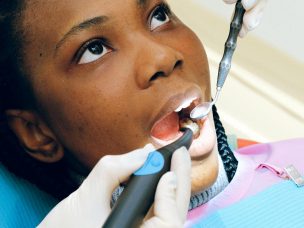Dr. Michelle Henry is a Harvard trained Mohs surgeon and a board-certified dermatologist. She is currently a Clinical Instructor of Dermatology at Weill Cornell Medical College where she practices Mohs micrographic, reconstructive, and cosmetic surgery. Dr. Henry attended medical school at Baylor College of Medicine in Houston, Texas and completed her residency in dermatology at Mount Sinai Hospital in New York City, where she served as Chief Resident. We recently sat down with Dr. Henry to discuss the effects of eczema on darker skin and the importance of cultural competency. Here’s what she had to say:
MDNewsline: What are the differences in the way eczema presents and progresses people of color?
Dr. Michelle: The progression is similar, there’s something we call the Atopic March and we see that in all skin types. So that’s really no different. With eczema and skin of color and that Atopic March, it means that it can start on the face when you’re younger and then it goes down to behind your knees and in front of your elbow. Then, ultimately, as adults, we see it more on our hands and feet. We call that the Atopic March that it transitions throughout the body from youth to adulthood.
That’s the same in, in all races, the darker your skin, the more you can have hyperpigmentation from eczema. You can see areas that are really quite dark and hyperpigmented. Post treating an eczema flare, we then have to tackle that hyperpigmentation. So that can be a little bit different. Also in darker skin types, especially in kids, you can see a type of eczema that has follicular prominence so that the follicles can be just more prominent. That’s the type of eczema we see more in the skin of color and we call that follicular prominence.
MDNewsline: How is eczema most often misdiagnosed?
Dr. Michelle: A lot of people misdiagnose eczema for food allergies. Sometimes you can have food allergies. Sometimes you can have just complete eczema. Some people will mistake eczema for rashes due to other things that the person has come into contact with. It can also be mistaken for psoriasis. Eczema, however, tends to be itchier than psoriasis. Oftentimes psoriasis isn’t itchy, although at times it can be. In younger kids, we can mistake eczema, especially nummular eczema for fungus or what people call ringworm.
MDNewsline: What are some misconceptions about eczema that need to be addressed?
Dr. Michelle: That there aren’t good treatments for it. We have really great treatments. We can do topical steroids, we can do good emollients and moisturizers at home.
Some people believe that it could be due to a lack of cleanliness and that’s completely incorrect. It’s a genetic condition we inherit from our parents. It can be triggered by things in the environment.
MDNewsline: Tell us about the breakthrough therapies available now that are hopeful and effective?
Dr. Michelle: There’s a great biologic now called Dupixent–that’s an injectable medication. So for patients who have been suffering from eczema, who’ve done the topical creams, they’ve done other oral medications, Dupixent or, dupilumab, is a great, new treatment that works quite well. It can really quiet eczema in some of the worst patients.
MDNewsline: What is your advice to doctors who are working to diagnose eczema?
Dr. Michelle: If you, if you’re unable to diagnose eczema never hesitate to refer your patient to a dermatologist. We see eczema in all ages, all skin types. For a lot of eczema, of course, we need medications, but a lot of the treatment of eczema is maintenance at home. So really talking to your patients about hypoallergenic creams, fragrance-free soaps, managing how they care for their clothes, and managing any triggers for their eczema is important. Join your patients in talking to the family about maintenance and that this can be a chronic lifelong condition and just providing support emotionally as well as in the office.
Follow Dr. Michelle Henry on Instagram and Twitter at @drmichellehenry
Related articles
Studies Show that Atopic Dermatitis is Harder to Treat in Black Patients
Mothers With Depression May Cause Atopic Dermatitis In Their Children










